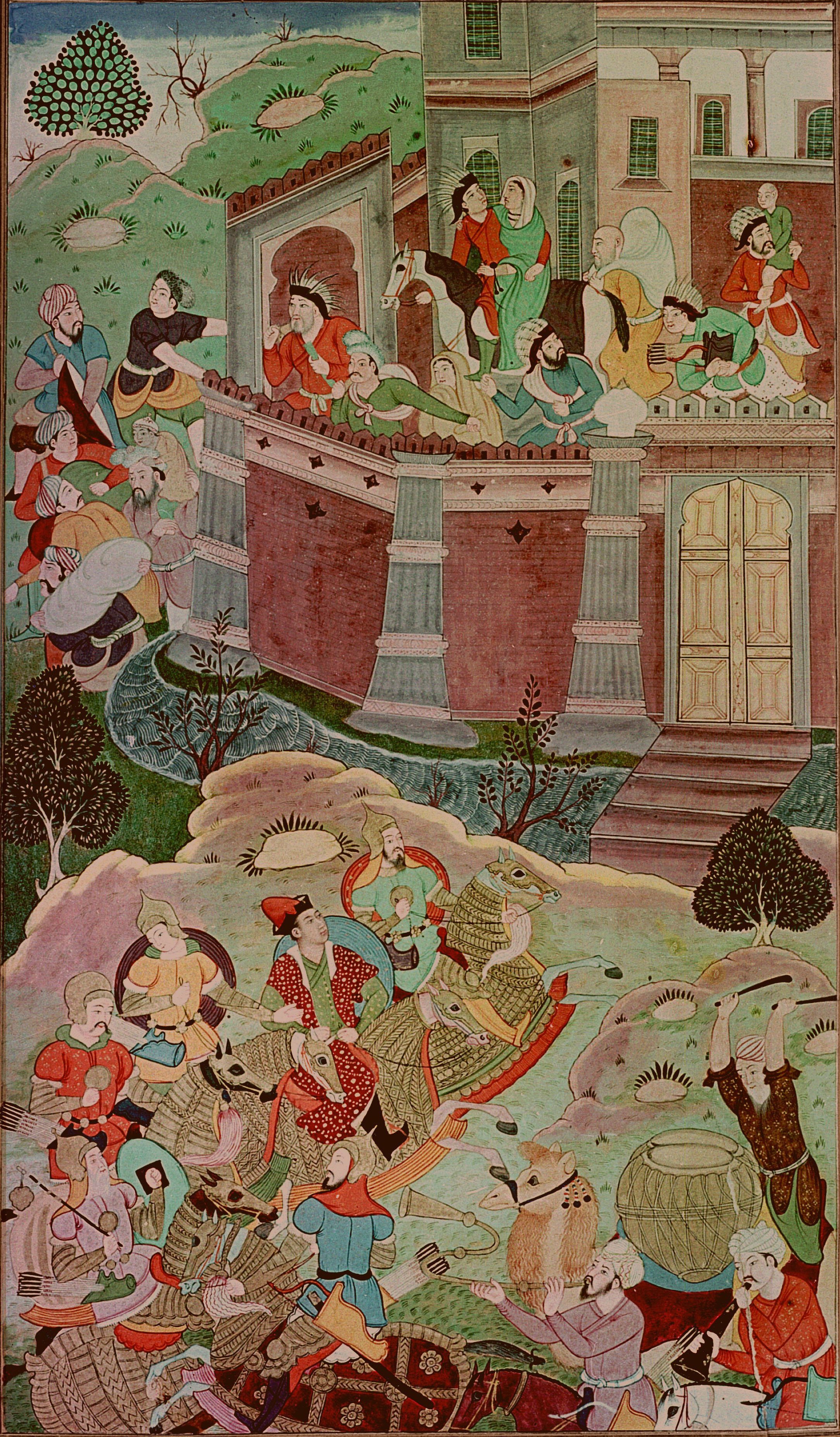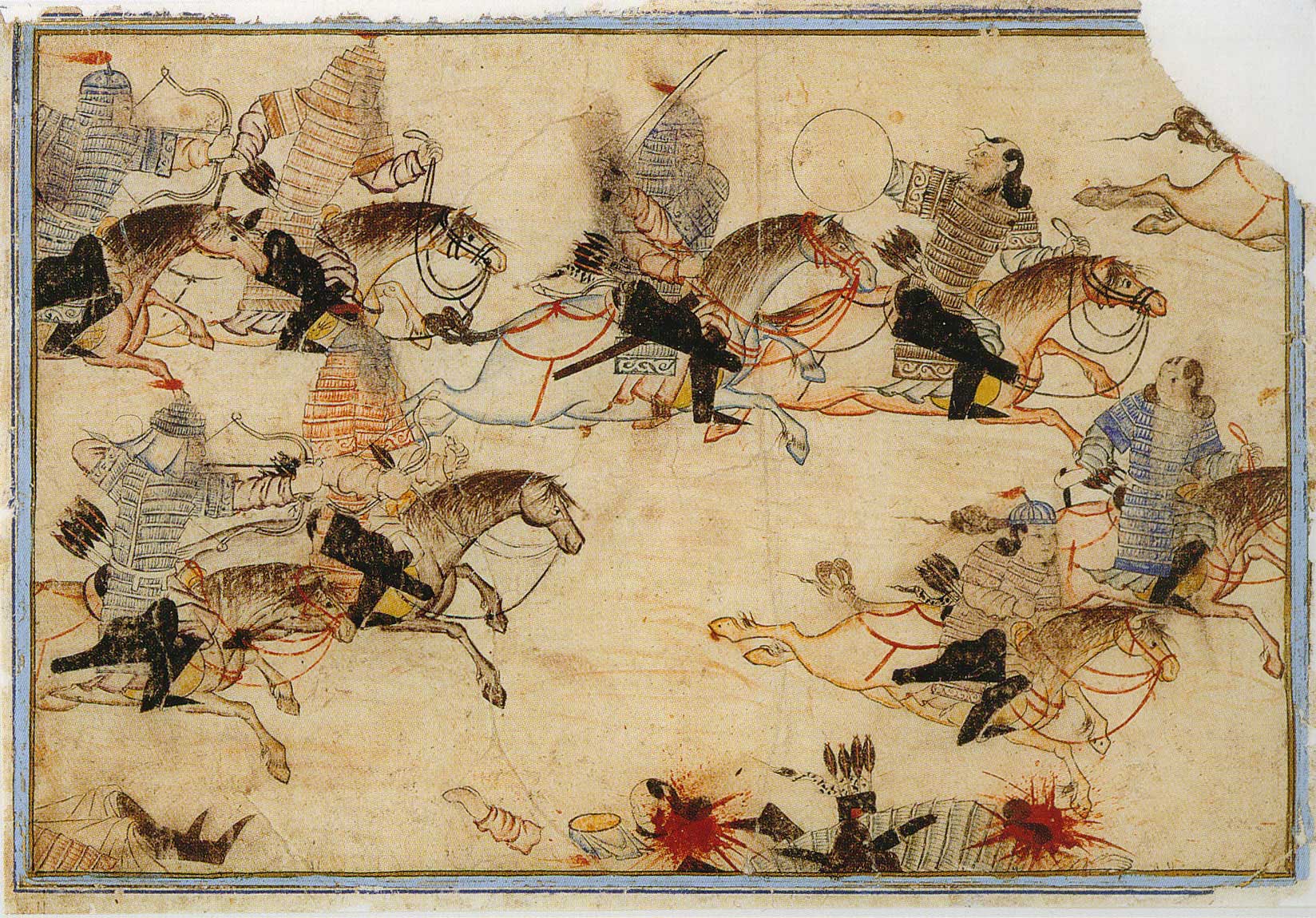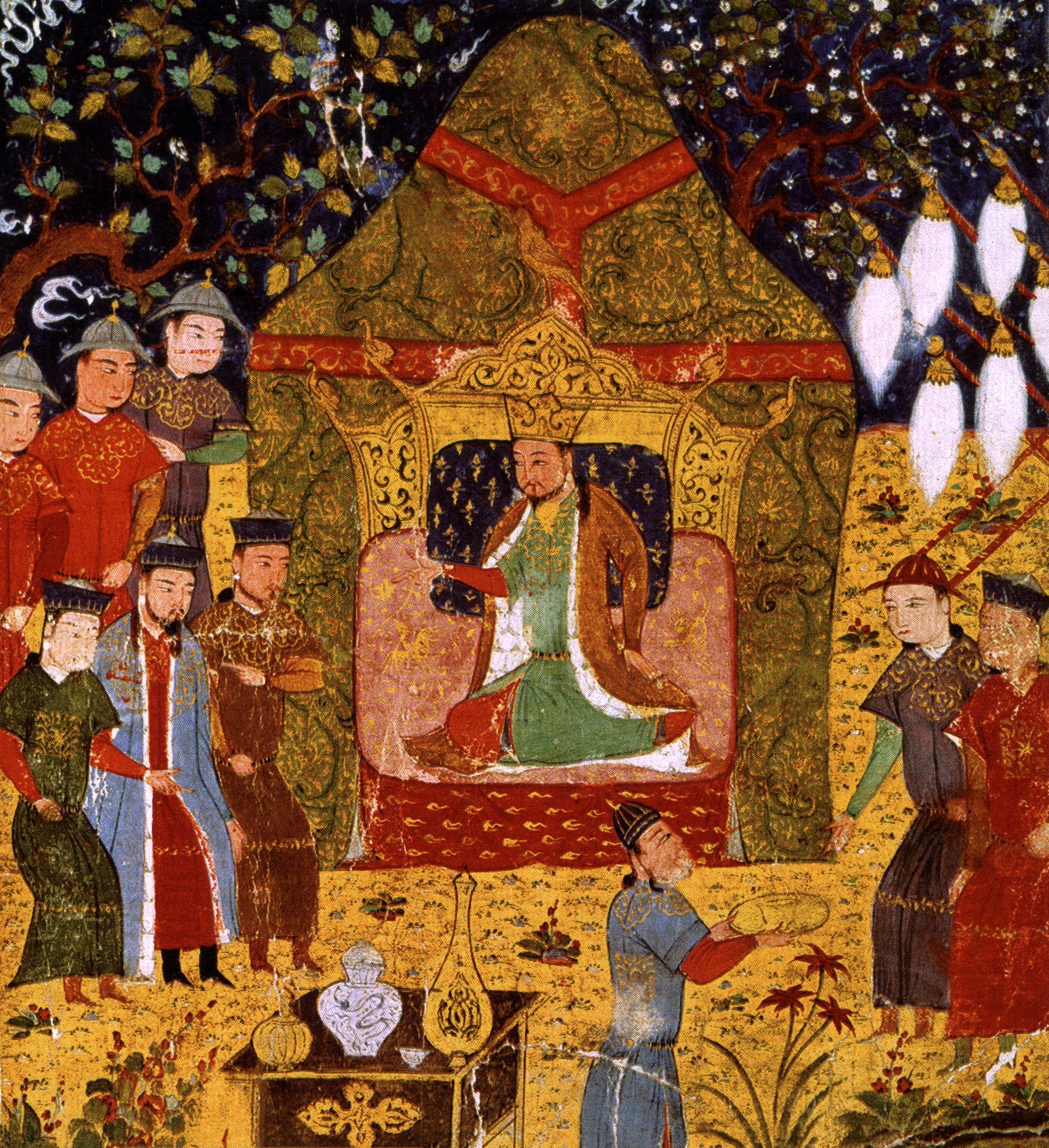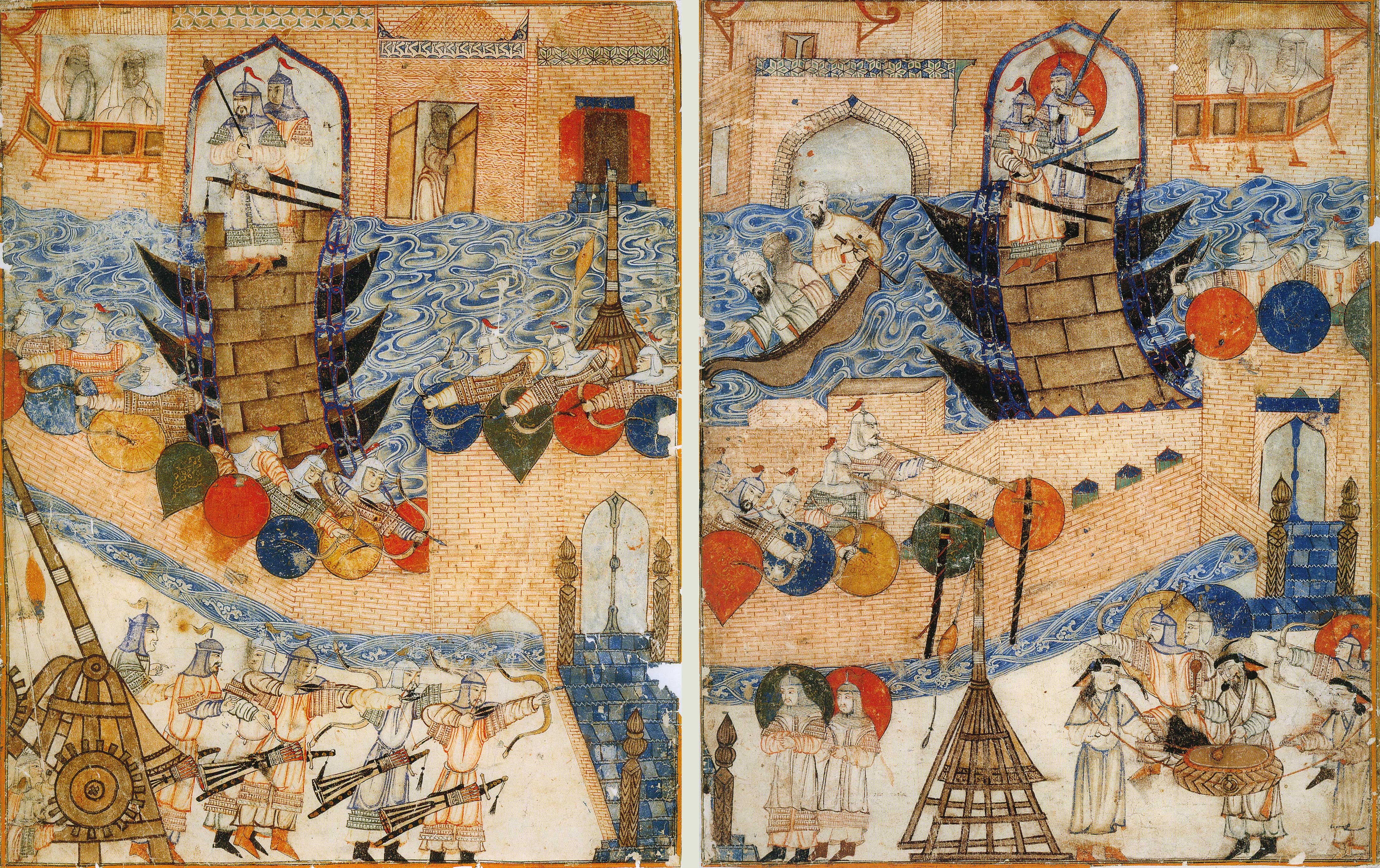|
Berke
Berke Khan (died 1266) (also Birkai; , tt-Cyrl, Бәркә хан) was a grandson of Genghis Khan and a Mongol military commander and ruler of the Golden Horde ( division of the Mongol Empire) who effectively consolidated the power of the Blue Horde and White Horde from 1257 to 1266. He succeeded his brother Batu Khan of the Blue Horde (West), and was responsible for the first official establishment of Islam in a khanate of the Mongol Empire. Following the Sack of Baghdad by Hulagu Khan, his cousin and head of the Mongol Ilkhanate based in Persia, he allied with the Egyptian Mamluks against Hulagu. Berke also supported Ariq Böke against Kublai in the Toluid Civil War, but did not intervene militarily in the war because he was occupied in his own war against Hulagu and the Ilkhanate. Name Berke is a name used by both Turkic peoples and Mongols. In Mongolian ''berke'' (cf. ''bärk'' in Old Turkic) means "difficult, hard". Birth Berke was born to Jochi, the eldest son of Genghi ... [...More Info...] [...Related Items...] OR: [Wikipedia] [Google] [Baidu] |
Golden Horde
The Golden Horde, self-designated as Ulug Ulus, 'Great State' in Turkic, was originally a Mongol and later Turkicized khanate established in the 13th century and originating as the northwestern sector of the Mongol Empire. With the fragmentation of the Mongol Empire after 1259 it became a functionally separate khanate. It is also known as the Kipchak Khanate or as the Ulus of Jochi, and replaced the earlier less organized Cuman–Kipchak confederation. After the death of Batu Khan (the founder of the Golden Horde) in 1255, his dynasty flourished for a full century, until 1359, though the intrigues of Nogai instigated a partial civil war in the late 1290s. The Horde's military power peaked during the reign of Uzbeg Khan (1312–1341), who adopted Islam. The territory of the Golden Horde at its peak extended from Siberia and Central Asia to parts of Eastern Europe from the Urals to the Danube in the west, and from the Black Sea to the Caspian Sea in the south, while border ... [...More Info...] [...Related Items...] OR: [Wikipedia] [Google] [Baidu] |
Mongol Empire
The Mongol Empire of the 13th and 14th centuries was the largest contiguous land empire in history. Originating in present-day Mongolia in East Asia, the Mongol Empire at its height stretched from the Sea of Japan to parts of Eastern Europe, extending northward into parts of the Arctic; eastward and southward into parts of the Indian subcontinent, attempted invasions of Southeast Asia and conquered the Iranian Plateau; and westward as far as the Levant and the Carpathian Mountains. The Mongol Empire emerged from the unification of several nomadic tribes in the Mongol homeland under the leadership of Temüjin, known by the more famous title of Genghis Khan (–1227), whom a council proclaimed as the ruler of all Mongols in 1206. The empire grew rapidly under his rule and that of his descendants, who sent out invading armies in every direction. The vast transcontinental empire connected the East with the West, and the Pacific to the Mediterranean, in an enforced '' Pax M ... [...More Info...] [...Related Items...] OR: [Wikipedia] [Google] [Baidu] |
Toluid Civil War
The Toluid Civil War was a war of succession fought between Kublai Khan and his younger brother, Ariq Böke, from 1260 to 1264. Möngke Khan died in 1259 with no declared successor, precipitating infighting between members of the Tolui family line for the title of Great Khan that escalated to a civil war. The Toluid Civil War, and the wars that followed it (such as the Berke–Hulagu war and the Kaidu–Kublai war), weakened the authority of the Great Khan over the Mongol Empire and split the empire into autonomous khanates. Background The Tolui family successfully enthroned their candidate for Great Khan, Möngke, in the kurultais of 1250 and 1251. The Ögedeid candidate for Great Khan, Shiremun, and his cousin Nakhu, were embittered by their loss and plotted a failed assassination of Möngke. Möngke took revenge by purging his opponents in the royal house, and members of both the Chagatai and Ögedei families. Möngke handed control over the Caucasus region to the Gold ... [...More Info...] [...Related Items...] OR: [Wikipedia] [Google] [Baidu] |
Division Of The Mongol Empire
The division of the Mongol Empire began when Möngke Khan died in 1259 in the siege of Diaoyu Castle with no declared successor, precipitating infighting between members of the Tolui family line for the title of khagan that escalated into the Toluid Civil War. This civil war, along with the Berke–Hulagu war and the subsequent Kaidu–Kublai war, greatly weakened the authority of the great khan over the entirety of the Mongol Empire, and the empire fractured into four khanates: the Golden Horde in Eastern Europe, the Chagatai Khanate in Central Asia, the Ilkhanate in Southwest Asia, and the Yuan dynasty in East Asia based in modern-day Beijing – although the Yuan emperors held the nominal title of khagan of the empire. The four divisions each pursued their own interests and objectives and fell at different times. Dispute over succession Möngke Khan's brother Hulagu Khan broke off his successful military advance into Syria, withdrawing the bulk of his forces to Mughan and ... [...More Info...] [...Related Items...] OR: [Wikipedia] [Google] [Baidu] |
Batu Khan
Batu Khan ( – 1255),, ''Bat haan'', tt-Cyrl, Бату хан; ; russian: хан Баты́й was a Mongol ruler and founder of the Golden Horde, a constituent of the Mongol Empire. Batu was a son of Jochi, thus a grandson of Genghis Khan. His '' ulus'' ruled over the Kievan Rus', Volga Bulgaria, Cumania, and the Caucasus for around 250 years. Personality and appearance According to Giovanni da Pian del Carpine, Batu was "kind enough to his own people, but he is greatly feared by them. He is, however, most cruel in fight; he is very shrewd and extremely crafty in warfare, for he has been waging war for a long time." William of Rubruck described him as about the height of his lord John de Beaumont and his entire face was covered with reddish spots. Early years After his son Jochi's death, Genghis Khan assigned Jochi's appanages to his sons. The Great Khan installed Batu as Khan of the Golden Horde (also known as the Ulus of Jochi or Kipchak Khanate). Jochi's eldes ... [...More Info...] [...Related Items...] OR: [Wikipedia] [Google] [Baidu] |
Ilkhanate
The Ilkhanate, also spelled Il-khanate ( fa, ایل خانان, ''Ilxānān''), known to the Mongols as ''Hülegü Ulus'' (, ''Qulug-un Ulus''), was a khanate established from the southwestern sector of the Mongol Empire. The Ilkhanid realm, officially known as ''Iranzamin'' (), was ruled by the Mongol House of Hulagu. Hulagu Khan, the son of Tolui and grandson of Genghis Khan, inherited the Middle Eastern part of the Mongol Empire after his brother Möngke Khan died in 1260. Its core territory lies in what is now part of the countries of Iran, Azerbaijan, and Turkey. At its greatest extent, the Ilkhanate also included parts of modern Iraq, Syria, Armenia, Georgia, Afghanistan, Turkmenistan, Pakistan, part of modern Dagestan, and part of modern Tajikistan. Later Ilkhanate rulers, beginning with Ghazan in 1295, converted to Islam. In the 1330s, the Ilkhanate was ravaged by the Black Death. Its last khan Abu Sa'id died in 1335, after which the khanate disintegrated. The ... [...More Info...] [...Related Items...] OR: [Wikipedia] [Google] [Baidu] |
Kublai Khan
Kublai ; Mongolian script: ; (23 September 1215 – 18 February 1294), also known by his temple name as the Emperor Shizu of Yuan and his regnal name Setsen Khan, was the founder of the Yuan dynasty of China and the fifth khagan-emperor of the Mongol Empire from 1260 to 1294, although after the division of the empire this was a nominal position. He proclaimed the empire's dynastic name "Great Yuan" in 1271, and ruled Yuan China until his death in 1294. Kublai was the second son of Tolui by his chief wife Sorghaghtani Beki, and a grandson of Genghis Khan. He was almost 12 when Genghis Khan died in 1227. He had succeeded his older brother Möngke as Khagan in 1260, but had to defeat his younger brother Ariq Böke in the Toluid Civil War lasting until 1264. This episode marked the beginning of the fragmentation of the empire. Kublai's real power was limited to the Yuan Empire, even though as Khagan he still had influence in the Ilkhanate and, to a significantly lesser deg ... [...More Info...] [...Related Items...] OR: [Wikipedia] [Google] [Baidu] |
Hulagu Khan
Hulagu Khan, also known as Hülegü or Hulegu ( mn, Хүлэгү/ , lit=Surplus, translit=Hu’legu’/Qülegü; chg, ; Arabic: fa, هولاکو خان, ''Holâku Khân;'' ; 8 February 1265), was a Mongol ruler who conquered much of Western Asia. Son of Tolui and the Keraite princess Sorghaghtani Beki, he was a grandson of Genghis Khan and brother of Ariq Böke, Möngke Khan, and Kublai Khan. Hulagu's army greatly expanded the southwestern portion of the Mongol Empire, founding the Ilkhanate of Persia, a precursor to the eventual Safavid dynasty, and then the modern state of Iran. Under Hulagu's leadership, the siege of Baghdad (1258) destroyed Baghdad's standing in the Islamic Golden Age and weakened Damascus, causing a shift of Islamic influence to the Mamluk Sultanate in Cairo and ended the Abbasid Dynasty. Background Hulagu was born to Tolui, one of Genghis Khan's sons, and Sorghaghtani Beki, an influential Keraite princess and a niece of Toghrul in 1 ... [...More Info...] [...Related Items...] OR: [Wikipedia] [Google] [Baidu] |
Jochi
Jochi Khan ( Mongolian: mn, Зүчи, ; kk, Жошы, Joşy جوشى; ; crh, Cuçi, Джучи, جوچى; also spelled Juchi; Djochi, and Jöchi c. 1182– February 1227) was a Mongol army commander who was the eldest son of Temüjin (aka Genghis Khan), and presumably one of the four sons by his principal wife Börte, though issues concerning his paternity followed him throughout his life. An accomplished military leader, he participated in his father's conquest of Central Asia, along with his brothers and uncles. Early life There is some question as to Jochi's true paternity. Shortly after Börte's marriage to Temüjin (later to become Genghis Khan), she was abducted by members of the Mergid confederation. She was given to a certain Chilger Bökh, who was the brother of the Yehe Chiledu, as a spoil of war. She remained in Chilger Bökh's captivity for a few months before she was recovered by Temüjin. Shortly afterwards she gave birth to Jochi. By all accounts, Temüji ... [...More Info...] [...Related Items...] OR: [Wikipedia] [Google] [Baidu] |
Siege Of Baghdad (1258)
The siege of Baghdad was a siege that took place in Baghdad in 1258, lasting for 13 days from January 29, 1258 until February 10, 1258. The siege, laid by Ilkhanate Mongol forces and allied troops, involved the investment, capture, and sack of Baghdad, which was the capital of the Abbasid Caliphate at that time. The Mongols were under the command of Hulagu Khan, brother of the khagan Möngke Khan, who had intended to further extend his rule into Mesopotamia but not to directly overthrow the Caliphate. Möngke, however, had instructed Hulagu to attack Baghdad if the Caliph Al-Musta'sim refused Mongol demands for his continued submission to the khagan and the payment of tribute in the form of military support for Mongol forces in Persia. Hulagu began his campaign in Persia against the strongholds of Nizari Ismailis, who lost their stronghold of Alamut. He then marched on Baghdad, demanding that Al-Musta'sim accede to the terms imposed by Möngke on the Abbasids. Although the A ... [...More Info...] [...Related Items...] OR: [Wikipedia] [Google] [Baidu] |
Ulaghchi
Ulaghchi (Ulaqchi or Ulavchii) Khan ( mn, Улаагч Хаан, tt-Cyrl, Улакчы хан) (died 1257) was the third khan of the Blue Horde and Golden Horde, ruling for less than a year in 1257. Life It is not clear whether Ulaghchi was the son or the younger brother of Sartaq Khan. Möngke Khan granted him the title of Khan of the Jochid Ulus (Golden Horde) as soon as Sartaq died. Ulaghchi came to power at the age of 10 under the regency of Boraqchin, the khatun of Batu Khan, and Sartaq's uncle, Berke. However, he died in office. H. H. Howorth claimed that he abdicated in favor of his uncle Berke, because the young man sent a person named Ulaghchi to Russia as his lieutenant after he was enthroned.H. H. Howorth ''The history of the Mongols'', p.II, D.II, p. 93. Genealogy *Genghis Khan * Jochi *Batu Khan Batu Khan ( – 1255),, ''Bat haan'', tt-Cyrl, Бату хан; ; russian: хан Баты́й was a Mongol ruler and founder of the Golden Horde, a constituen ... [...More Info...] [...Related Items...] OR: [Wikipedia] [Google] [Baidu] |
Mengu-Timur
Munkh Tumur or Möngke Temür ( mn, ᠮᠦᠨᠺᠬᠲᠡᠮᠦᠷ, Мөнхтөмөр; russian: Мангутемир, Mangutemir) (?–1280), son of Toqoqan Khan and Köchu Khatun of Oirat (daughter of Toralchi Küregen and granddaughter of Qutuqa Beki) and the grandson of Batu Khan. He was a khan of the Golden Horde, a division of the Mongol Empire in 1266–1280. His name literally means "Eternal Iron" in the Mongolian language. Early reign and foreign policy During his reign, the Mongols together with their subjects, several Turkic tribes and the Russian princes, undertook military campaigns against Byzantium (c. 1269–1271), Lithuania (1275), and Alans in Caucasus (1277). The very first yarlyk (license) found by historians was written on behalf of Mengu-Timur and contained information on the release of the Russian Orthodox Church from paying tribute to the Golden Horde, however, he was a shamanist. During the reign of Mengu-Timur, the Genoese traders purchased Caffa ... [...More Info...] [...Related Items...] OR: [Wikipedia] [Google] [Baidu] |




.jpeg/1200px-Prise_d'Alamût_(1256).jpeg)

